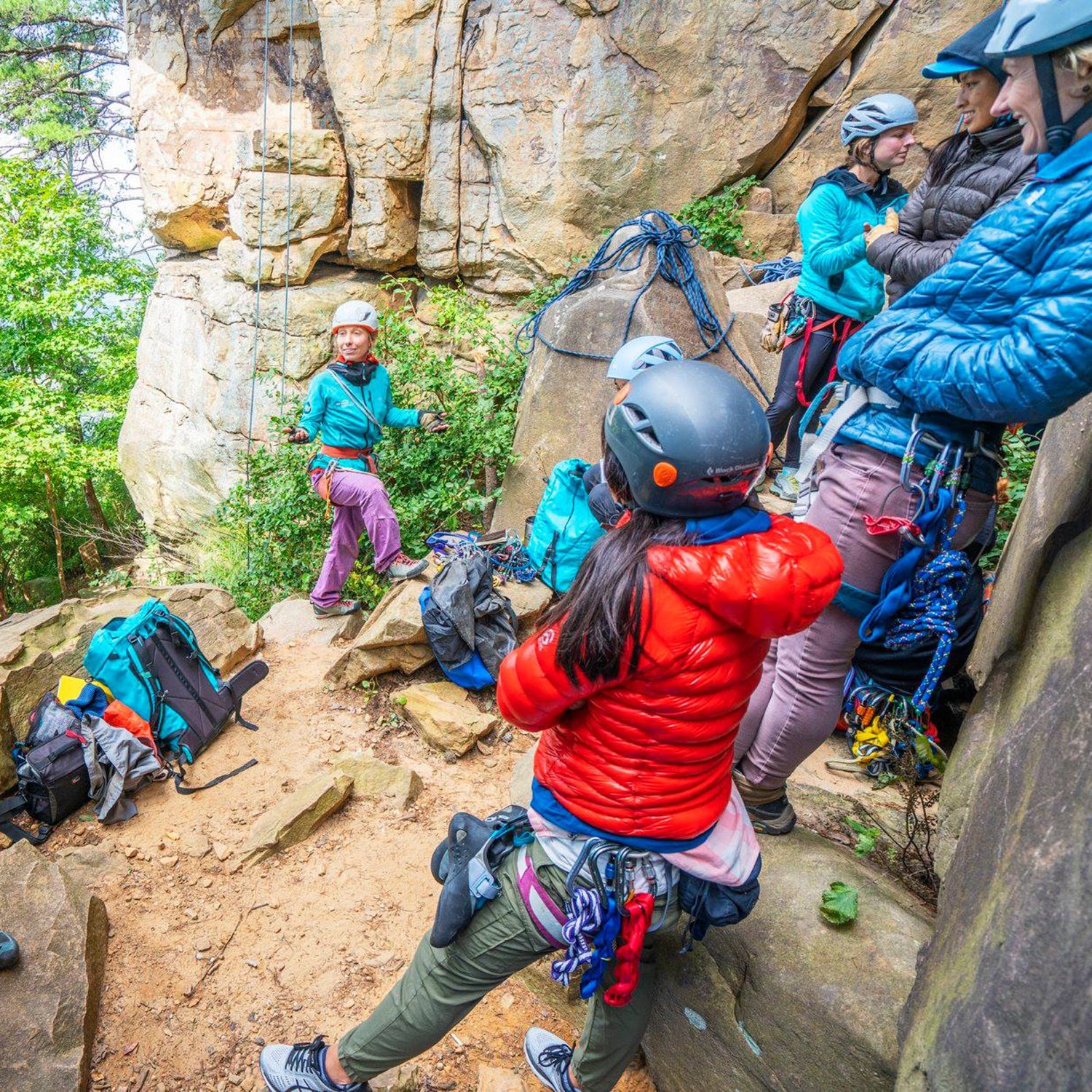You’ve heard of avalanche safety courses—perhaps your backcountry partners have been urging you to take one—how they equip you to make better decisions in terrain that could avalanche, and how to save your friend’s life if they get caught and buried. But what’s the equivalent of “Avy 1” for rock climbers? Where do recreational climbers go to get this type of education?
The ��was started to address the need for a standard, uniform curriculum in avalanche education in 1998. Chances are, if you’ve taken an avalanche course it was from an AIARE provider. Similarly, the American Mountain Guides Association (AMGA) provides standardized education to certify professional rock, alpine, and ski guides. The key word being professional. While you can easily find intro to climbing courses offered by your local guiding company, there’s no national standard. The American Alpine Institute provides its courses in multiple locations across the country, which means you’ll get a level of uniformity from that one company, but in most cases exactly what and how you’ll learn will vary depending on the provider and the instructor.��
While the AMGA certifies professional guides at national standard, right now no such nationally standardized curriculum exists for learning at the recreational level. , the organization behind the popular , wants to create one from the ground up. “We found a gap and no one was addressing it,” says Flash Foxy founder, Shelma Jun. “Depending on where you go to seek education, it’s going to be different.”
This spring, Jun’s company will partner with local guiding outfits (who already have the permits and area expertise) and use AMGA-certified guides to teach the new Flash Foxy curriculum for recreational climbers who want to be safe while climbing outside and develop their skills.
“A lot of recreational climbers take the course who aren’t even interested in being guides, but they take it because they want to learn, in a standardized environment, how to be safe,” says Jun of the three-day course designed for climbing instructors.
The climbing industry continues to explode, and according to 2014 data,�� who participate��in climbing in the U.S.
“When I learned to climb 20��years ago, there was only a small amount of people new to the sport and you could find mentorship more easily,” says big-wall climber, former member of Yosemite Search and Rescue, and Flash Foxy’s curriculum creator, Josie McKee. “Now there are so many new people jumping into climbing outside, and they often don’t know the best safety practices.”��
While some people can learn well online, learning from a person in real life is ideal, says McKee. Rappelling accidents are the most common cause of fatalities in climbing, and probably not something you want to learn on the internet when the cost of doing it incorrectly is your life.��
Jun says that , mainly because all these new climbers mean a lot of people need mentors. “We’re creating avenues for folks who are learning in the gym and want to get out but are nervous to do that without safety knowledge,” says Jun.��
The will provide courses designed for recreational climbers to learn safety standards and best practices, coupled with McKee’s experience from over a decade of teaching. They’ll focus on skills like anchor systems, environmental responsibility, and managing fear. McKee’s curriculum will incorporate the AMGA’s safety standards.��
“The AMGA’s focus is oriented toward guiding people instead of teaching people. Our curriculum is focused on helping people develop skills so they don’t need guides,” says McKee. “Our program uses the standards I’ve learned from my training with the AMGA.”
The classes will start small with hopes of expansion.��Flash Foxy will utilize their own trained instructors, but work with local guiding companies—Whitney Basecamp and �´dz����’s Wilderness, in the Eastern Sierra and Colorado’s Front Range, respectively, to start—to offer their courses.��
The program kicks off this spring in those two locations with four courses: self-rescue, multi-pitch techniques and efficiency, leading trad, and intro to sport climbing outdoors. Each class is two full weekend days and costs $375 per person.��
The courses are taught by AMGA-certified instructors who are women, non-binary, LGBTQIA+, BIPOC, and from other underrepresented groups. The ones this spring are being offered to those who identify as women or non-binary, but Flash Foxy plans to open the courses to all genders in the future. “We believe these course offerings are important to provide a space that empowers learning and growth for participants,” says McKee.
If the demand is there, they’ll add more topics and expand to locations across the country. Depending on the level of success, says Jun, it could eventually become something where there’s a specific course progression and certifications (like what the AMGA does for guides).
“The American Mountain Guides Association is thrilled to see a group of our members developing this new initiative,” says Alex Kosseff, executive director of AMGA. “We’re particularly excited about Flash Foxy’s ability to engage diverse communities across the country in high-quality climbing.”
Registration��opened for spring 2020 on February 24��at 9 AM Mountain Time.


